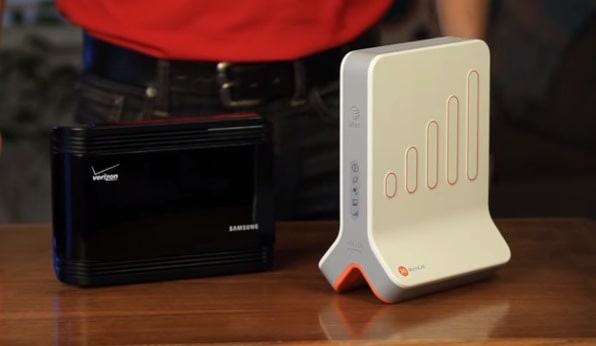Blog
Cell Phone Signal Booster or Femtocell?
April 22, 2022 — by NICHOLAS JONES
SHARE ARTICLE[Sassy_Social_Share total_shares="ON"]
Many people have asked us about the difference between a femtocell, sometimes called a microcell, and a cell phone signal booster. Both can improve your cell coverage, but they operate differently. This post breaks down the differences between a cell signal booster and a femtocell for you.
How a femtocell (microcell) works
A femtocell or microcell is a low-power base station. It works with your broadband Internet connection to enhance cell phone coverage by creating a signal source, or a “micro” cell site, inside your home. For consumer use, the coverage area is typically a single room.
Voice and data traffic moves across your cell carrier’s network and is delivered to the femtocell via an Internet gateway. Your phone communicates directly with the femtocell, which typically has a range up to about 50 feet. Some carriers have their own microcell that they offer to their customers, like the AT&T microcell.
Residential femtocell models usually support up to four or five simultaneous connections, while enterprise models can support a dozen or more.
The pros of using a femtocell
- These devices can create a signal inside even if there is absolutely no cellular signal outside.
- They may provide a faster connection for data than typical cellular signals.
- Depending on the device model, can cover anywhere from a single room up to an entire building.
The cons of using a femtocell
- Femtocells rely on high speed internet which is not available everywhere.
- Your cell phone will drop the connection if you move out of femtocell range. If you’re on a call or downloading, you must remain within range until you are finished with your call or download.
- Femtocells will only support cellular devices for one specific carrier. Anyone who uses a different carrier cannot benefit from a femotcell’s improved cell service.
- To benefit from a femtocell, cellular devices must be synched to the femto. That means family members, roommates or coworkers with unsynched phones can’t benefit from your improved cell service.
- There could be additional monthly charge on your cell service provider’s bill for the femtocell equipment.
- Femtocells use your internet connection’s bandwidth to operate, and so could possibly slow other Internet traffic.
- Femtocells will not work in a vehicle.
Signal booster or femtocell?
When trying to decide if a signal booster or femtocell is right for you, consider how a signal booster works.
A cell signal booster works by detecting the cell signal outside a building, bringing it inside and amplifying it, and then rebroadcasting the amplified signal to the interior space so your phone can use it.
These systems are bi-directional, meaning that it will also help your cell phone communicate with the cell tower using the same process in reverse order. Cell phone booster systems can be used to boost the signal in weak signal areas and inside buildings where cellular signals can’t penetrate..
For a deeper explanation you can check out this How Boosters Work page.
The pros of using a cell signal booster
- Signal boosters operate independently from your Internet connection.
- Connections are maintained and “handed off” when the cell phone switches from receiving signal through the signal booster to receiving signal from the cell tower, and vice versa.
- You buy the equipment once, with no monthly reoccurring charge.
- Booster systems almost always work with multiple carriers.
- Boosters typically work with all cell devices within range, no synching required.
- Boosters support multiple cellular devices operating simultaneously across multiple carriers.
- Various models of vehicle boosters are available for cars, trucks and RVs.
- Signal boosters help conserve battery life.
The cons of using a cell signal booster
Before choosing a signal booster or femtocell, keep in mind that booster systems do not create cellular signal, they enhance it. If there is absolutely no detectable cellular signal, a booster system will not work. However, a signal can exist but simply be too weak for your phone to detect. In these cases, that weak signal can still be picked up by the ultra-sensitive receivers of a signal booster and delivered to your device so you can use it.
What are cell phone signal boosters? Learn more here
Want to learn more? Check out our Consumer Guide to Cell Phone Signal Boosters!
buttonbutton SHARE ARTICLE[Sassy_Social_Share total_shares="ON"]TAGS: Education

Comments (2)
patrick leonard on March 21, 2016 at 4:31 pm said:
What is the best antenna for my f 250 truck?
weBoost Support on March 21, 2016 at 10:28 pm said:
Patrick Leonard,
Thank you for your question. The type of antenna for your truck can depend on a few different things like, the type booster system, truck body type, and band coverage needs. We would like to work with you directly to help determine which booster might be the best fit for your situation. You can reach us here:
http://support.weboost.com/hc/en-us/requests/new